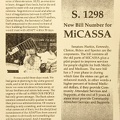[Headline] Activists press prez on disabled rights
No one wants to go to a nursing home to die. Most people plan to live in their own homes, regardless of what happens to their physical or mental abilities. But if they can't, a nursing home may be the only option, especially for those on Medicaid or Medicare, which fund long-term institutional care but cover little if any home health care.
There can be a better way. This week, five Missoulians, members of a grassroots organization called ADAPT, will be in Washington, D.C., to lobby for the rights of disabled Americans and dismantle the system of long-term, institutionalized care that no one likes.
Bob Liston is one of the ADAPT activists hoping to get the attention of President Bush. In 1999, the U.S. Supreme Court declared in the decision of Olmstead v. L.C. that unnecessarily institutionalizing people with disabilities was a form of discrimination. The court also ruled that disabled people could choose to receive long-term care in their homes, in their own communities. Early in the Bush administration, the new president promised to sign an executive order implementing the Supreme Court decision. But Bush has not signed the order, nor has he included any funding in his budget to help states comply with the court's decision.
Nearly every state is working to implement Olmstead, says Liston, but few have the staff or the money to do so. Montana is no exception.
There are 120 people in Montana's two institutions for the disabled—in Boulder and Glendive and there are another 160 developmentally disabled Montanans in nursing homes around the state, he says. Montana taxpayers spend $120,000 a year for each institutionalized person at Boulder, and nursing home care runs about $35,000 per person Liston says ADAPT believes that money could be better spent on personal attendants or home health care.
"The services you get shouldn't be based on where you live," he says. "The money should follow the individual, not the [nursing home] bed."
Implementing Olmstead nation-wide would cost about $70 million to start. "The money we're talking about is really nickels and dimes, and we think the money is there," Liston says.
And it's money that would pay for the things most of us take for granted, like rent, he notes. It would also pay the salaries of the people hired to care for the disabled in their own homes. "People who provide personal assistance should be able to get paid more to help someone in life-and-death matters that someone who is ffipping burgers," as Liston puts it.
ADAPT activists hope to meet with Bush and convince him to sign the order putting Olmstead into effect, thereby "affording all Americans the same civil rights."
Carlotta Grandstaff
- Erstallt den
- Donneschten 18 Juli 2013
- Agedroen den
- Samschten 14 November 2020
- Albumen
- Visitten
- 179
- Bewäertungs-Stand
- nach keng Bewäertung
- Foto bewäerten


0 Kommentaren